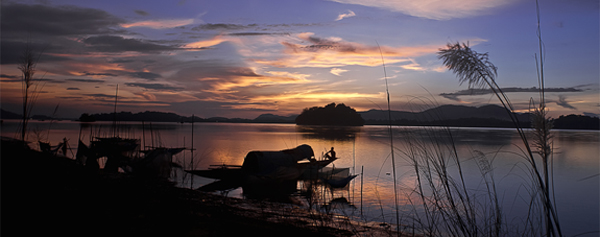Toward a True India-Bangladesh Joint Rivers Commission.
Editors Note: Our previous installments on water security and transboundary waters (here and here), have included discussions of shared water resources as a vehicle for peaceful relations between neighboring nations. In this special dispatch to EarthDesk, Anumita Raj describes how Strategic Foresight Group’s Blue Peace initiative is addressing relations between India and Bangladesh. Blue Peace advocates collaborative, comprehensive and sustainable solutions to transboundary water issues as an instrument of peace, rather than conflict, and as a basis for even broader co-operation between nations.
Anumita reports on SFG’s India-Bangladesh Roundtable, “Blue Peace in the Eastern Himalayas,” convened July 1-2, 2013, and attended by 25 senior diplomats, Members of Parliament, former ministers and experts from India and Bangladesh. She is a senior program manager for SFG, a global think tank based in Mumbai, India engaged in water security-based initiatives across the world, including the Himalayan region, the Middle East and the Nile Basin in Africa. — John Cronin

Evening on the Brahmaputra River, by Donvikro (Own work) [CC-BY-SA-3.0], via Wikimedia Commons
Strategic Foresight Group convened an India-Bangladesh Round table on ‘Blue Peace in the Eastern Himalayas’ at a time when overall relations between India and Bangladesh are improving, particularly since the visit of the Prime Minister of Bangladesh to India in 2010 and the Indian Prime Minister to Bangladesh in 2011. However, there remain unresolved issues over transboundary water resources which need to be addressed urgently.
The Joint Rivers Commission between India and Bangladesh is responsible for the management of all 54 transboundary rivers.
The roundtable emphasized the importance of creating robust and sustainable institutions for collaborative water management which can withstand short term political dynamics. In this context, the current functioning of the Joint Rivers Commission between India and Bangladesh, the body responsible for the management of all 54 transboundary rivers including the enormously significant Ganges and Brahmaputra rivers, is extremely inadequate.
There are, in effect, two parallel national river commissions, instead of one joint commission. It is necessary to establish an India Bangladesh Joint Rivers Commission headed by a prominent Indian or Bangladeshi leader on an alternative basis. The Commission should have a team comprising of nationals from both the countries who can undertake necessary activities for sustainable management of shared water resources in a joint and collaborative manner. It is also important for the Joint Rivers Commission to have an arbitration clause with a well-defined mechanism to resolve differences and conflict of interest.
Any long term planning for the sustainable management of water resources must take into account the potential impact of climatic and environmental factors.
Considering that many of the rivers shared by India and Bangladesh originate from third countries such as Nepal and China, it is also important to have a gradual multilateral approach towards including third countries in the process of water cooperation. The roundtable welcomed the trilateral talks between India, Bangladesh and Bhutan and the possibility of similar talks between India, Bangladesh and Nepal in the future. In the long term it would be necessary to explore ways of cooperation between all countries in the Eastern Himalayan river systems.
The roundtable emphasized the importance of taking into account the impact of climate change on water resources in the river basins shared by India and Bangladesh. As climate change can influence floods, droughts, sea level, rainfall and salinity, any long term planning for the sustainable management of water resources must take into account the potential impact of climatic and environmental factors.
Any effort for sustainable management for water resources in transboundary resources would only be meaningful if there is also efficient utilization and quality control of resources within the countries. Therefore the roundtable emphasized the significance of sound water governance and pollution control in domestic and international waters alike.
The participants in the roundtable were optimistic about the prospects of India and Bangladesh for sustainable management of water resources because of the new trends in cooperation for conservation and governance of natural resources. The two countries have already agreed on a programme of collaboration for preserving the ecology of the mangroves of the Sunderbans, and particularly replenishing the fresh water supply to the area. There is also an agreement for joint Environmental Impact Assessment and sharing of information with regards to the Tipaimukh hydropower project. More such agreements are under discussion.
With this existing spirit of cooperation, it should be possible to construct sustainable institutions for cooperation such as the reinvention and restructuring of Joint Rivers Commission. Moreover it will be appropriate to explore how water cooperation can be used as an instrument of broader economic cooperation by increasing connectivity, harnessing the energy potential, exploring eco-tourism and other innovative commercial activities for improving livelihood conditions of the people in the basin. The roundtable concluded with confidence in the prospects of bilateral cooperation between India and Bangladesh driven by cooperation in shared water resources achieving a momentum with support from all political forces and other stakeholders in the two countries.
««»»
Anumita Raj is a Senior Program Manager for Strategic Foresight Group working on the South Asian region. She is the Joint Coordinator for the South Asia Security Unit and is responsible for collating reports and analyzing the socio-political, economic, environmental and security-related developments in the region. As Joint Coordinator of the Horizon Scanning Unit (Asia), she co-led a team analysing emerging trends impacting poor populations in South and South East Asia, with a focus on India. Contact Anumita at anumitar@strategicforesight.com











Thank you John and Gautam for your comments. They are much appreciated.
Gautam, I would agree that there has certainly been some disagreement between India and Bangladesh regarding water. I do think, though, that the Blue Peace approach is likely to be more successful in a case like India-Bangladesh. It has proven to be effective in cases like the Middle East and the Nile basin where countries have outright hostile relations between many parties. In the case of India and Bangladesh, there is already significant mutual interest and at least a certain amount of co-operation. If you would like to read more, please do check out the Water Diplomacy section on our website. http://strategicforesight.com/focus.php?id=2#.UejbUqz_SUM
India-Bangladesh relations have become thornier with each passing year, especially due to the contentious Farakka Barrage, a structure that India built in the 60s and 70s. The barrage severely restricts the amount of water that is able to flow into Bangladesh. India has used the barrage to play a hegemonic role in the region, which has played a significant role in the deterioration of relations between the two countries. Given the politics in both India and Bangladesh, and this checkered history of water politics between the two nations, I’m not as confident as the author about the emergence of long-term sustained cooperation. However, I’ll be thrilled if history proves me wrong, and if the two countries are able to forge a sustainable agreement.
Thank you for a great post – that was indeed a very interesting session. You and your readers might be interested in a few words I wrote on water and rule of law just prior to this panel.
http://worldjusticeproject.org/blog/water-and-rule-law-changing-tides-0
All the best,
John